Umno won another important by-election, securing 80 percent of the overall vote and winning with a 20,648 majority.
Umno and the Madani government are touting the result as evidence that Umno “is back” and “proof” that cooperation between Pakatan Harapan and the party is a “winning” formula.
A detailed analysis of the results suggests that these interpretations are over-optimistic and perhaps even flawed. In fact, a closer look at voting points to serious weaknesses in the Madani alliance.
Most importantly, however, this result is not about Umno - it speaks to a bigger problem for Bersatu and the Perikatan Nasional coalition.
This piece analyses the Mahkota results using polling station results and highlights three findings - the parallel of the 2024 general election results to the March 2022 state election results in which Bersatu has only limited support, a deepening of “no choice” politics where non-Malays, in particular, are not voting for Umno but against the PAS-led PN and a serious disengagement of voters, especially non-Malays.
Looking collectively at the more frequent decisions not to vote, Malaysians are losing confidence in the electoral process, a concern for Malaysian democracy.

This election is a wake-up call for Bersatu and, to a lesser extent, PAS, whose electoral cooperation with Muhyiddin’s party on the ground has been poor.
Internal sabotage, with PAS giving its electoral partner lacklustre support, is one of the factors contributing to Bersatu’s losses, along with others detailed below.
Bersatu’s electoral decline
Former prime minister Muhyiddin Yassin’s party, Bersatu, has lost three by-elections in a row - Mahkota, Nenggiri and Kuala Kubu Baharu.
In fact, when one looks at the polls since the 2022 general election, Bersatu has lost all of the by-elections it has contested, including Pulai in September 2023.
Within PN, the Islamist party PAS is winning seats, most recently in Sungai Bakap last July. PAS benefits from this so that it can dominate PN.
On the ground in all three by-elections fielding Bersatu candidates, PAS did not go all out for the PN candidate, as many PAS supporters opted not to vote.
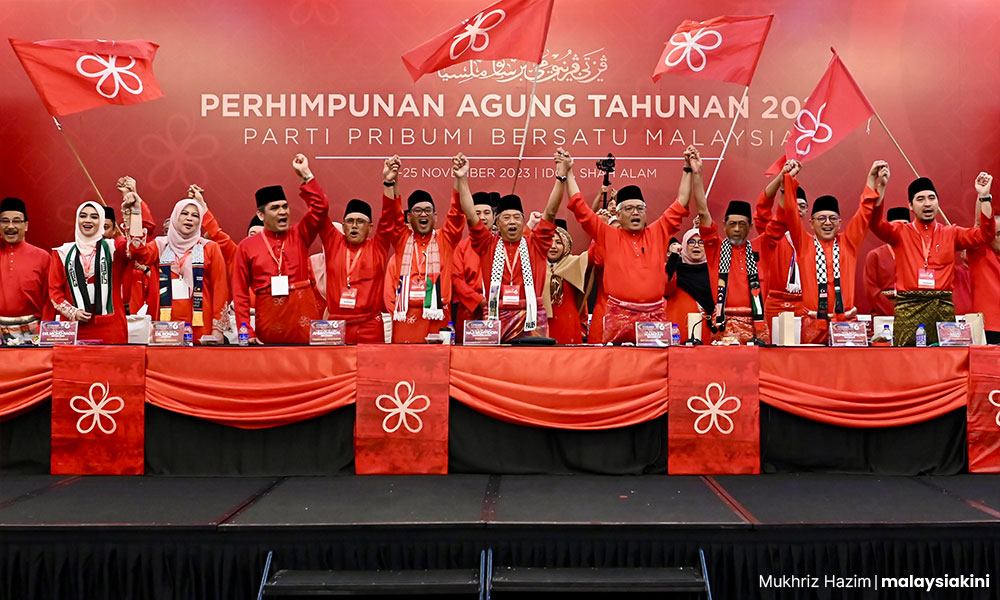
Bersatu’s problem is not just its electoral partner. There is also infighting within the party. Factionalism has prevented the party from working as an electoral unit.
While there are compromises over party positions, the factions are clearly unable to work together effectively in campaigning.
The factor that is perhaps the most significant in explaining Mahkota’s loss is a decline in support for Muhyiddin. Mahkota is a loss in his home state of Johor. His electoral “pull” has significantly weakened.
Part of this is the legal cases that have impacted public perceptions of him. He also appears as an angry man at a time when anger is not as strong a mobiliser and, arguably, off-putting for many voters.
This is partly because the credit Muhyiddin received for his governance during Covid-19 has faded as Malaysians look to a post-Covid context.
Muhyiddin no longer evokes the same warm “Abah” figure, even among many Malays, as he did in the past. He appears as a leader past his time.
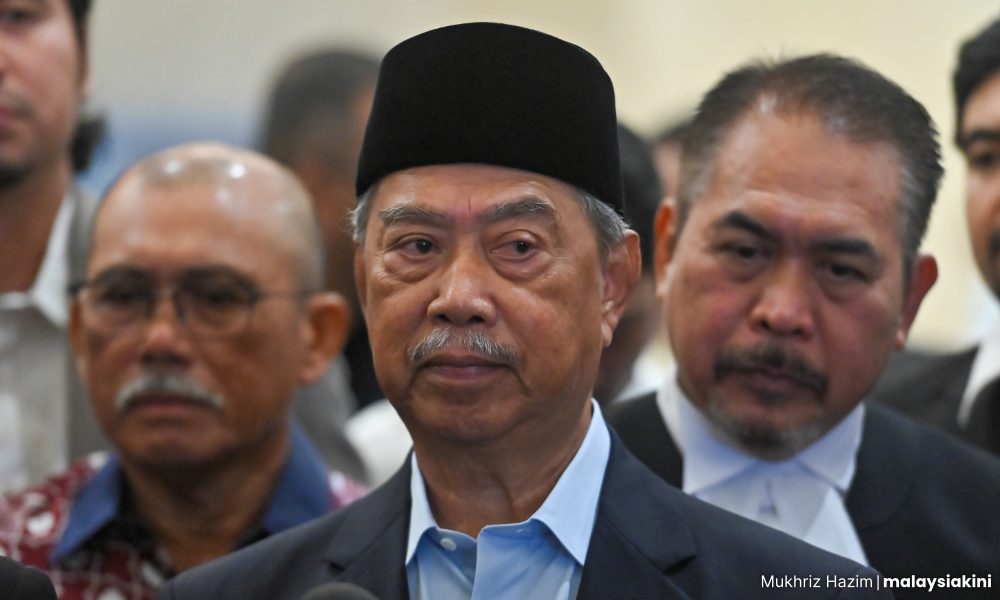
Bersatu’s support among Malays returned to the levels of the Johor elections in March 2022, an estimated 31 percent, lower than the state polls where estimated support reached 35 percent.
‘No choice’ dynamic - limited Harapan voters to Umno
The crowing of Umno in its victory should be seen more realistically. The support it gained from the collaboration with Harapan only gave it a few more points from where it was in 2018 - an estimated 69 percent compared to 64 percent. This was also among a smaller pool of voters.
The support among Malays is strong for Umno, but this should not be equated with support for PKR or other Harapan parties. It also should be seen as a vote for the government of the day, a factor that is common in by-elections where the government has the resource advantage.
The gains for Umno were among non-Malay voters, with the overwhelming majority of those who voted supporting Umno among Chinese, Indians, and, to a lesser extent, among Borneo communities. These gains in the actual number of non-Malay voters were limited.
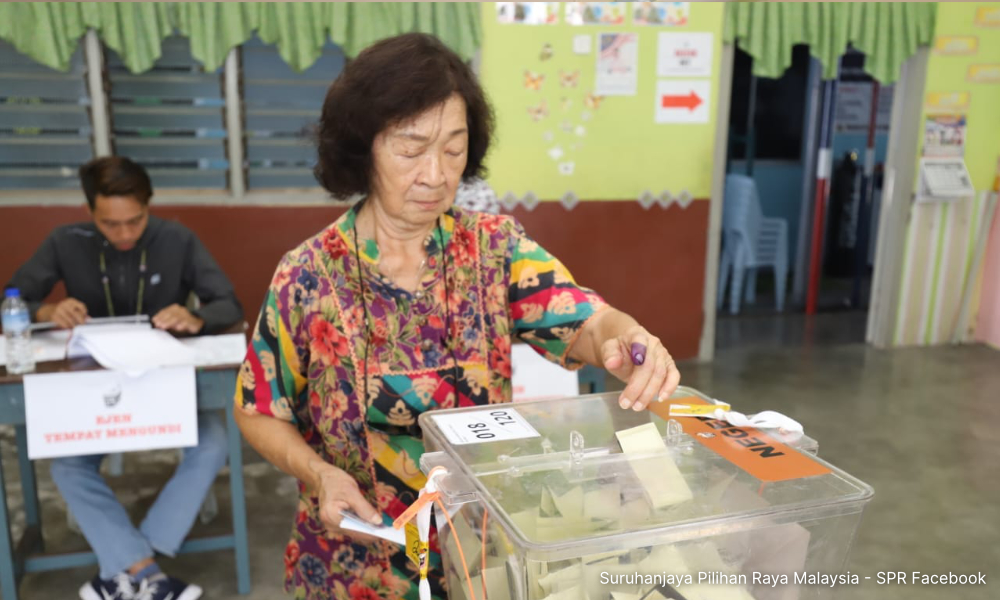
Moreover, the dynamic in voting is not one of choosing Umno. It is primarily about rejecting PN and Bersatu, especially the campaigning that focused on religious issues.
PN’s problem with non-Malays is long-standing, as the hate speech in their campaigning has not been forgotten, retriggered by the issues raised in the Mahkota by-election.
Starting the Mahkota campaign with the “Dijamin halal” focus on religious issues was a mistake by PN. This coalition continues to believe that voters primarily vote on religious issues, which is not the case, especially among practical Johoreans.
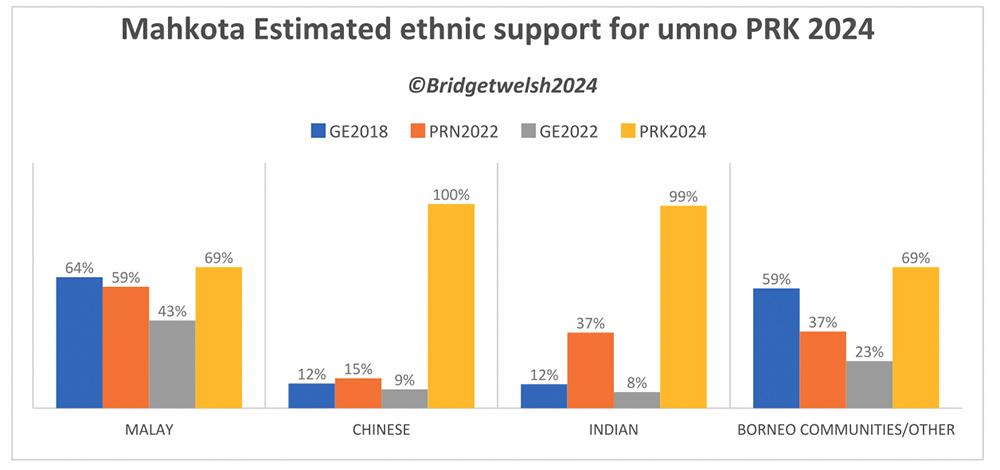
Over and over, Mahkota non-Malays bemoaned the lack of electoral choice in the campaign, complaining bitterly about Umno Youth chief Dr Muhamad Akmal Saleh’s racism and disrespect of non-Malays.
The dynamic of “no choice” politics is real, and it would be foolhardy to continue dismissing the disappointment among non-Malaysians about Madani's governance.
The result was not a vote for Madani or Umno but against Bersatu and PAS.
Voter disengagement
The most striking feature of the election results is the persistent disengagement of voters. Younger voters did not return to vote, and, as the estimated ethnic turnout findings below show, a majority of non-Malays did not come out to vote.
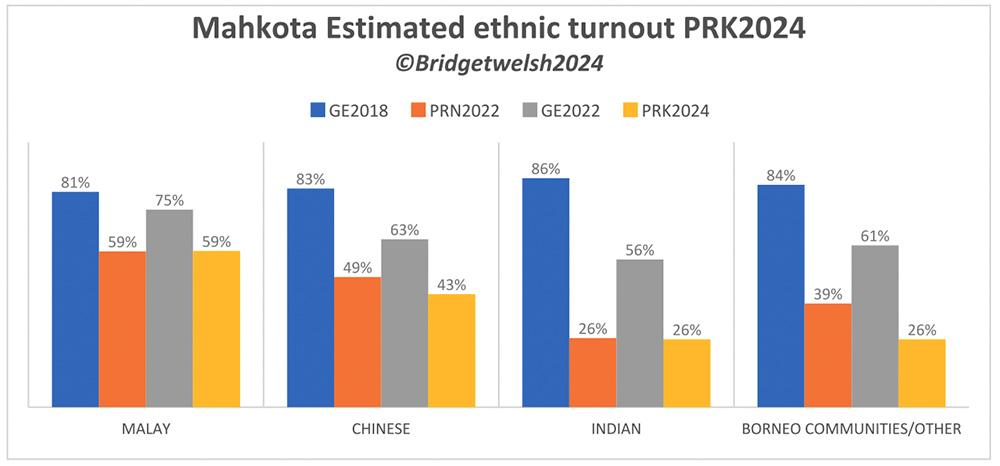
Chinese voter turnout reached a record low in the Mahkota by-election, an estimated 43 percent. Among Indians, who continue to feel neglected and disrespected by the Anwar government, turnout reached an estimated 26 percent, as it did in March 2022.
These numbers speak to an indictment of the engagement of non-Malays, as voters are choosing not to vote.
Looking forward
The Madani government should be careful to recognise that this level of turnout would not get many of the parties re-elected.
The question that should be asked is whom the cooperation between Harapan and Umno benefits and at what cost.
Disengagement and disappointment among non-Malays is real. Umno is benefitting from the alliance electorally, but this does not necessarily mean the reverse is true, as losses in other by-elections show low support from Umno voters to Harapan parties.
The by-election should be a wake-up call for all concerned, especially Bersatu. But the changes are broader. Malaysians are turning away from the polls. With only slightly over a majority voting, this is not a good sign of a healthy democracy.
It may be easy to dismiss this as a by-election, but the findings reinforce trends in multiple elections. The result should be treated with more concern rather than celebration. - Mkini
BRIDGET WELSH is an honourary research associate of the University of Nottingham’s Asia Research Institute, a senior research associate at Hu Fu Center for East Asia Democratic Studies, and a senior associate fellow at The Habibie Centre. Her writings can be found at bridgetwelsh.com.
The views expressed here are those of the author/contributor and do not necessarily represent the views of MMKtT.

No comments:
Post a Comment
Note: Only a member of this blog may post a comment.